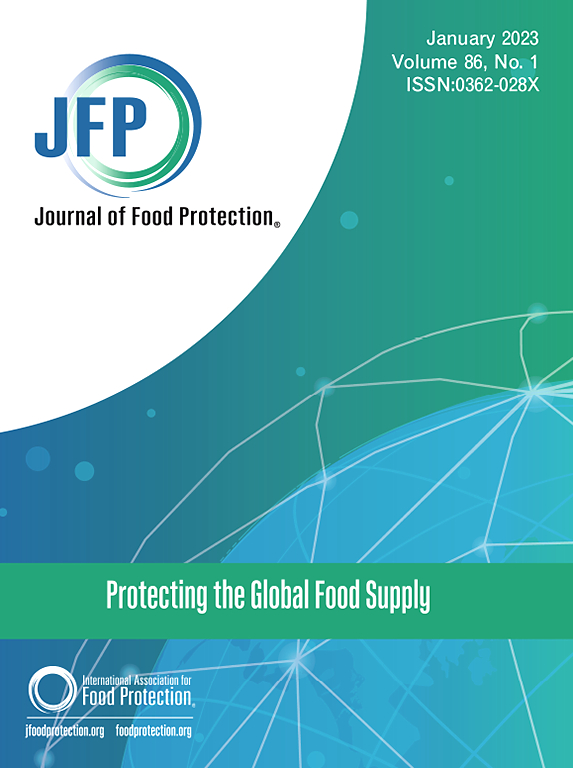Synthesis and Effectiveness of a Novel Food Safety Toolkit for Low-Literacy Novice Food Handlers
IF 2.1
4区 农林科学
Q3 BIOTECHNOLOGY & APPLIED MICROBIOLOGY
引用次数: 0
Abstract
The state of Texas announced a requirement for all foodservice employees to pursue an American National Standards Institute (ANSI) certified food handler training in September 2016. However, the effectiveness of ANSI-certified food safety training for low-literacy novice food handlers has not been investigated. Low-literacy novice food handlers are those who have some familiarity with the field but may not have the literacy level or may have a language barrier that is as an obstacle to completing the training and/or certification. This study aimed to develop a novel food safety training toolkit (NTK) as a supplementary resource to existing ANSI-certified training tools and evaluate its effectiveness in improving food handlers’ knowledge retention and certification. To achieve this, a mixed-method study was conducted. For the first part of the research, one-on-one interviews were conducted with foodservice stakeholders (managers, sanitarians, owners) to identify the gaps and needs that exist in the current food safety training system. In the second part of the research, NTK was synthesized and designed with clear illustrations and drawings based on previous education and training literature. A between-subjects experiment was conducted to assess the effectiveness of NTK on food handlers’ food safety knowledge. Results showed that the participants’ overall food safety knowledge significantly increased due to NTK when compared to the control group. This study is distinctive because it directly responds to the needs of the foodservice industry, and the study output (NTK) can serve as the cornerstone to fill the gap in current food safety training for low-literacy or novice food handlers in the future.
一个新的食品安全工具箱的合成和有效性,为低文化水平的新手食品处理。
2016年9月,德克萨斯州宣布要求所有餐饮服务员工参加美国国家标准协会(ANSI)认证的食品处理人员培训。然而,ansi认证的食品安全培训对低文化新手食品处理的有效性尚未调查。低文化水平的新手食品处理人员是那些对该领域有一定了解但可能没有文化水平或可能有语言障碍的人,这是完成培训和/或认证的障碍。本研究旨在开发一种新的食品安全培训工具包(NTK),作为现有ansi认证培训工具的补充资源,并评估其在提高食品加工人员知识保留和认证方面的有效性。为此,进行了一项混合方法研究。在研究的第一部分,对餐饮服务利益相关者(经理、卫生工作者、业主)进行了一对一的访谈,以确定当前食品安全培训体系中存在的差距和需求。在研究的第二部分,根据以往的教育和培训文献,对NTK进行了综合和设计,并配有清晰的插图和图纸。本研究采用被试间实验,评估NTK对食品业者食品安全知识的影响。结果显示,与对照组相比,参与者的整体食品安全知识因NTK而显着增加。本研究的独特之处在于它直接回应了餐饮服务业的需求,而研究输出(NTK)可以作为基石,以填补目前对低文化或新手食品处理人员的食品安全培训的空白。
本文章由计算机程序翻译,如有差异,请以英文原文为准。
求助全文
约1分钟内获得全文
求助全文
来源期刊

Journal of food protection
工程技术-生物工程与应用微生物
CiteScore
4.20
自引率
5.00%
发文量
296
审稿时长
2.5 months
期刊介绍:
The Journal of Food Protection® (JFP) is an international, monthly scientific journal in the English language published by the International Association for Food Protection (IAFP). JFP publishes research and review articles on all aspects of food protection and safety. Major emphases of JFP are placed on studies dealing with:
Tracking, detecting (including traditional, molecular, and real-time), inactivating, and controlling food-related hazards, including microorganisms (including antibiotic resistance), microbial (mycotoxins, seafood toxins) and non-microbial toxins (heavy metals, pesticides, veterinary drug residues, migrants from food packaging, and processing contaminants), allergens and pests (insects, rodents) in human food, pet food and animal feed throughout the food chain;
Microbiological food quality and traditional/novel methods to assay microbiological food quality;
Prevention of food-related hazards and food spoilage through food preservatives and thermal/non-thermal processes, including process validation;
Food fermentations and food-related probiotics;
Safe food handling practices during pre-harvest, harvest, post-harvest, distribution and consumption, including food safety education for retailers, foodservice, and consumers;
Risk assessments for food-related hazards;
Economic impact of food-related hazards, foodborne illness, food loss, food spoilage, and adulterated foods;
Food fraud, food authentication, food defense, and foodborne disease outbreak investigations.
 求助内容:
求助内容: 应助结果提醒方式:
应助结果提醒方式:


